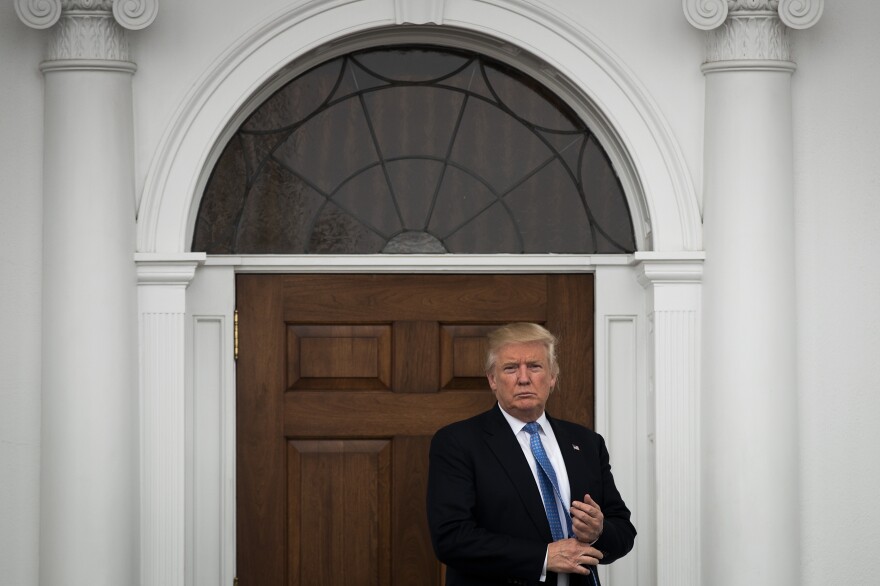During the presidential campaign, Donald Trump promised the biggest tax cut since Ronald Reagan's conservative revolution swept into Washington in the 1980s.
A big part of that tax cut would go to corporations. The president-elect says that will fuel investment and growth. Skeptics say the plan would explode the federal budget deficit.
Top business tax rate slashed
Trump's proposal would slash the top business tax rate from 35 percent, the highest in the industrial world, to 15 percent — but he says that, at the same time as he's cutting tax rates, he'll also close lucrative tax loopholes.
One of them, known as "carried interest," allows billionaire hedge fund managers to halve the taxes on large proportions of their income. During the campaign, Trump called carried interest "one of the greatest provisions, for people like me."
"I'll be honest with you," he said. "I give up a lot when I run."
Len Burman, a co-director of the independent Tax Policy Center, says that — far from being hurt — Trump probably would be a huge beneficiary of his proposed tax plan.
Burman points out that Trump's new 15 percent tax rate would apply to all businesses.
"And if that's the case," Burman says, "billionaire real estate magnates will get a very big tax cut."
Stephen Moore, a senior fellow at the Heritage Foundation and a senior economic adviser to Trump, says the benefits will be widespread — that it won't be just big business receiving tax relief.
"Every small business in America would also get this 15 percent tax break," he says,"as long as they reinvest the profits back into the company."
A new loophole?
High-income earners also could benefit, a Tax Policy Center analysis finds. Burman says top wage earners could decide to transform themselves into contractors — essentially creating one-employee businesses — to take advantage of the low tax rate.
"I would tell my employer I'm now a contractor, rather than an employee," says Burman. The worker would send an invoice for his services rather than collect a paycheck, and he'd be eligible to pay a 15 percent tax rate instead of a 33 percent tax rate.
Burman says you could get around the requirement to "reinvest the profits" by taking money out of the company as dividends — taxed at a 20 percent rate under the Trump plan, still much less than top individual tax rate of 33 percent in the proposal.
The Tax Policy Center estimates that if half of American wage earners making over $100,000 a year adopted this strategy, it would cost the U.S. government more than $650 billion in lost tax revenue over 10 years.
The Heritage Foundation's Moore, who helped develop the tax plan, says that if individuals wage earners tried this maneuver, the Trump administration would respond.
"That's scamming the system," Moore says. "And we want to make sure that people don't have an opportunity to shift their income from one type to another just to take advantage of this lower tax rate. We're going to try to slam shut those loopholes."
Easier said than done, says Burman. Would those already classified as contract workers be allowed to pay the 15 percent rate? How could you prohibit others from adopting the status?
Bigger budget deficits?
In addition to the huge cut in business tax rates, Moore says the Trump proposal also would allow businesses to immediately write off the cost of investments, rather than deducting them over a period of years.
The result, he says, will be more business investment, which will boost worker productivity, wages and growth. That will produce more tax revenue, he says.
"I'm not saying the tax cuts are going to pay for themselves," Moore says, "but I do think there's an economic growth dividend that you get."
In the short run that may be true, says Burman of the Tax Policy Center. But in the long run, he argues, the economy will suffer because the tax cuts will create huge budget deficits and higher interest rates.
"Over the long run, there'd be less investment, lower wages and a smaller economy than there would have been without the plan," says Burman.
Moore says deficits won't explode, because the estimated shortfall in tax revenue — about $3 trillion over 10 years — will be covered by cuts in federal spending. That would require cutting about half of all the government's non-defense discretionary spending, which includes federal funding for law enforcement, education, transportation and research.
Copyright 2022 NPR. To see more, visit https://www.npr.org.





